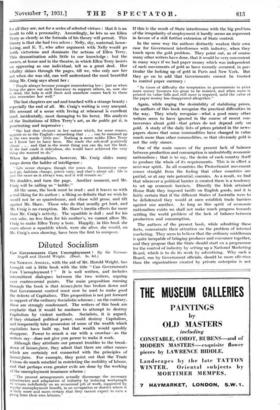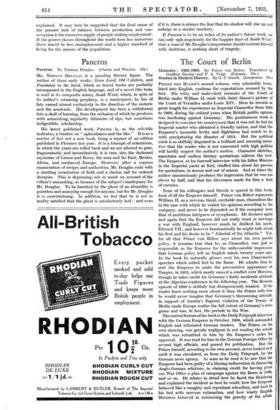Diluted Socialism
Can Governments Cure Unemployment ? By Sir Norman Angell and Harold Wright. (Dent. 3s. 6d.)
SIR NORMAN ANGELL, with the aid of Mr. Harold Wright, has
brought out a little book with the title Can Governments Cure Unemployment ? " It is well written, and includes intermittent dialogues between the two writers, arguing
over controversial points. The main proposition running through the book is that laissez-faire has broken down and
that Government control must now be used to make good
the defects of Capitalism. This proposition is not put forward in support of the ordinary Socialistic schemes ; on the contrary,
these are strongly condemned. The writers of this book are emphatic that it would be madness to attempt to destroy Capitalism by violent methods. Socialists, it is argued, if they obtained political power, could destroy capitalism and temporarily take possession of some of the wealth which capitalists have built up, but that wealth would speedily disappear. Power to smash a car with . a crowbar—as the writers say—does not give you power to make it work.
Although they attribute our present troubles to the break- down of laissez-faire, they admit that there are other causes which are certainly not connected with the principles of laissez-faire. For example, they point out that the Trade Unions do much mischief in restricting the mobility of labour,
and that perhaps even greater evils are done by the working of the unemployment insurance scheme :
" The present arrangements actually discourage the necessary adjustments and adaptation of industry by inducing workpeople to remain indefinitely on an occasional job of work; supported regular unemployment benefit, in an occupation or district where it is daily more and more. certain that they cannot expect to earn a .living from their own labours." . . .
. If this is the result of State interference with the big problean - of the irregularity of employment it hardly seems an argument in favour of a still further extension of State control.
In the same way the authors distinctly weaken their own case for Government interference with industry, when they touch upon the gold problem. They point out, as of course many other writers have done, that it would be very convenient in many ways if we had paper money which was independent of such movements of gold as have recently occurred, in par- ticular the locking up of gold in Paris and New York. But they go on to add that Governments cannot be trusted to control paper currency :
" In times of difficulty the temptation to governments to print more money becomes too great to be resisted, and when more is printed its value falls and still more is required, until the value of the paper money has disappeared altogether."
Again, while urging the desirability of stabilising prices, the authors of this book recognize the practical difficulties in the way. They wisely recognize—what a good many other writers seem to have ignored in the course of recent con- troversies about gold—that prices do not depend only on gold. A study of the daily lists of prices printed in the news- papers shows that some commodities have changed in value much more than other commodities, so that obviously gold is not the only sinner.
One of the main causes of the present lack of balance between production and consumption is undoubtedly economic nationalism ; that is to say, the desire of each country itself to produce the whole of its requirements. This is in effect a semi-war spirit. In all countries the Protectionist movement comes straight from the feeling that other countries are partial, or at any rate potential, enemies. As a result, we find that wherever a political barrier is created there is a tendency to set up economic barriers. Directly the Irish attained Home Rule they imposed tariffs on English goods, and it is fairly certain that if the different States of Australia were to be defederated they would at once establish trade barriers against one another. As long as this spirit of economic nationalism exists we shall not make much progress towards settling the world problem of the lack of balance between production and consumption.
The authors of the present book, while admitting these facts, concentrate their attention on the problem of internal marketing. They seem to believe that the ordinary middleman is quite incapable of bringing producer and consumer together, and they propose that the State should start on a programme for the control of industry by setting up a National Marketing Beard, which is to do its work by advertising. Why such a Board, run by Government officials, should be more effective than the organizations created by private enterprise is not explained. It may here be suggested that the final cause of the present lack of balance between production and con- sumption is the excessive supply of people seeking employment. If the poorer classes throughout the world were less numerous there would be less unemployment and a higher standard of living for the masses of the population.















































 Previous page
Previous page